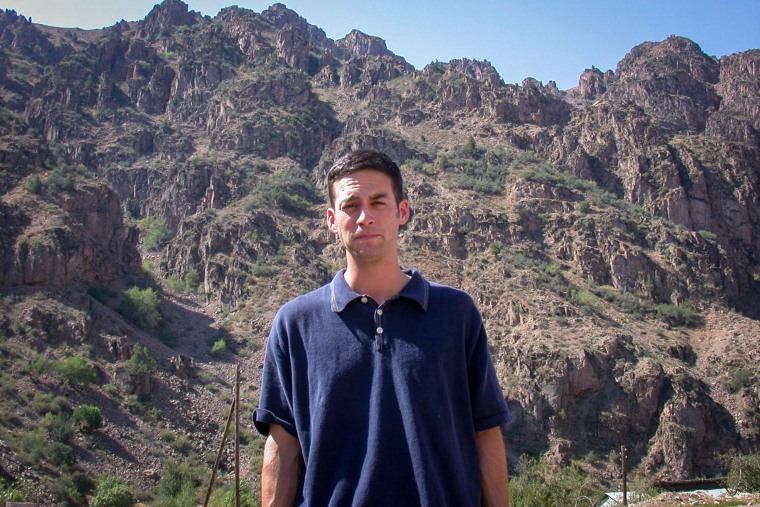Veterans wait 30 years on average for the U.S. to acknowledge toxic exposures, new report says (original) (raw)
Sept. 18, 2024, 4:00 PM UTC
Army Staff Sgt. Mark Jackson kept a daily journal, documenting how he became permanently sickened while stationed at the Karshi-Khanabad Air Base in Uzbekistan in 2003.
Yellow tabs protrude from his blue spiraled notebook, marking dozens of pages in which he logged his growing list of health issues.
“The air here is poison,” he wrote on July 28, 2003, shortly after arriving at the Soviet-era air base, according to journal entries he shared with NBC News.
The symptoms emerged one by one throughout the pages: stomach cramps, incessant headaches and extreme exhaustion. By the time Jackson made it back to Melbourne, Florida, in April 2004, the former marathoner said he could barely walk up a flight of stairs.
From 2006 to April of this year, he was diagnosed with an underactive thyroid disease, irritable bowel syndrome, gastroesophageal reflux disease, anemia, testicular necrosis and osteoporosis. In 2020, Jackson, now 47, said his doctor told him, “You have the bones of an 80-year-old woman.”
Jackson filed for disability compensation for all his ailments but said he only got approved for the thyroid disease. He is among many veterans who say they are waiting for the government to recognize that their illnesses are related to military toxic exposure, advocates say.
A report released Wednesday found that sick veterans have waited an average of 31.4 years from when they first made contact with dangerous toxins on duty to when the government acknowledged they were exposed.

Mark Jackson at the mountains in northern Uzbekistan in 2003.Courtesy DAV Communications
The report by the Military Officers Association of America and DAV, formerly known as Disabled American Veterans, analyzed military toxic exposures in the last century to determine how long it took the Department of Veterans Affairs or Congress to formally recognize that the exposures caused disabilities.
Three decades is a “shamefully long” time for veterans to wait, the groups said in the report, especially considering the prevalence of toxins at military bases and deployment sites.
“There isn’t a major conflict in the past 100 years that has been immune to this epidemic,” the report said.
About 2.7 million service members who fought in the Vietnam War may have been exposed to the cancer-causing herbicide Agent Orange from 1962 to 1975, officials said.
But the first veterans to be exposed had to wait nearly 30 years before Congress passed the Agent Orange Act of 1991, which established a link between the herbicide and certain cancers and diseases. Under the law, affected veterans no longer needed to show they were exposed to Agent Orange to get disability compensation.

A plane spraying Agent Orange in Vietnam.Dick Swanson / Getty Images file
Most recently, in August 2022, lawmakers passed the PACT Act, which expanded benefits to millions of veterans exposed to burn pits in Iraq and Afghanistan and other toxic substances. Before then, advocates said it was challenging for veterans to prove their sickness was related to their service in order to receive disability compensation.
“In both those instances, and for many other military toxic exposures, it took decades for the VA and Congress to finally act,” Wednesday’s report said. “Some died before achieving justice.”
Veterans exposed on U.S. soil have had to wait even longer.
In one of the largest water contamination cases in U.S. history, up to 1 million people who lived or worked at Camp Lejeune from 1953 to 1987 may have been exposed to a drinking water supply contaminated with chemicals that have been linked to severe health problems, including cancers and birth defects, federal health officials said.
In 2012, Congress passed a law that provided health care and other benefits to qualifying veterans who served at the U.S. Marine Corps training facility in North Carolina, as well as their families.
In response to the report, VA press secretary Terrence Hayes said the agency was "grateful for the feedback" from its partners and that it will "continue to work with them to fulfill our shared mission."
"At VA, we make every decision with one goal in mind: provide Veterans with the care and benefits they’ve earned as quickly as possible," Hayes said in a statement to NBC News.
"We’re currently delivering more care and more benefits to more Veterans than ever before," he added. "But make no mistake — we will not rest until every Veteran gets the care and benefits they deserve."
‘My health is at risk, and I can do nothing’
From 2001 to 2005, more than 15,000 service members deployed to the Karshi-Khanabad Air Base in Uzbekistan, known as K2, in support of the war in Afghanistan, officials said.
Those veterans may have encountered several hazardous exposures, including volatile organic compounds from jet fuel vapors and depleted uranium, the VA said on its website.
While at K2, Jacksonnoted in his journal that there were chemical dumping grounds around him and signs everywhere that warned of radiation. In the air, he wrote, there was a “smell of burning plastic” trash.
“My health is at risk, and I can do nothing,” he wrote on Aug. 9, 2003.

Mark Jackson at Walt Disney World in Orlando, Fla., last year.Courtesy DAV Communications
The PACT Act made all K2 veterans eligible for VA health care for every condition, the VA said, adding that more than 13,000 of them are enrolled. It also recognized that K2 veterans were exposed to burn pits and particulate matter but not all toxic exposures, including depleted uranium.
That means veterans like Jackson have a higher burden to prove their illnesses were caused by toxic exposure during their military service while applying for disability, advocates say. Their claims are decided case by case, the VA said.
Last month, the VA announced it was taking steps to acknowledge that K2 veterans were exposed to several contaminants of concern. Hayes said the agency would continue working with the Defense Department to “ensure that we consider any additional hazards from K2.”
The agency said it is conducting a scientific review to determine whether there is a relationship between toxic exposures and three conditions — acute leukemias, chronic leukemias, and multiple myeloma outside of the head and neck — for service members who deployed to Uzbekistan and other locations.
The advocacy groups behind Wednesday’s report said the report provides a road map for legislative and policy changes that they say would shorten the recognition process.
They called on Congress to enact legislation to expand and fund research, monitoring, surveillance and oversight of all federal activities related to toxic exposures.
Jackson, who now works as a federal criminal investigator, said he would value the federal recognition over any amount of money.
“Living with symptoms is difficult,” he said, “but living without validation and causation of your symptoms is maddening.”
Melissa Chan is a reporter for NBC News Digital with a focus on veterans’ issues, mental health in the military and gun violence.
